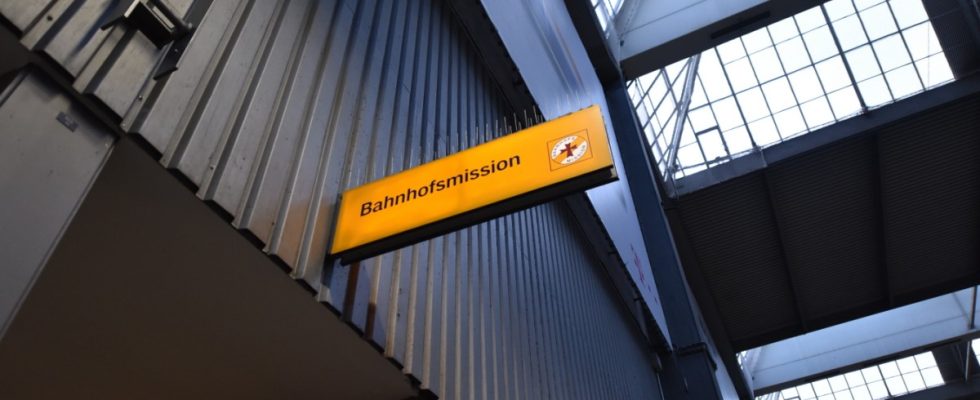There are currently twelve train station missions in Bavaria, between Lindau and Hof, between Passau and Aschaffenburg. The Kempten location had to close last year, Bamberg and Rosenheim did the same a few years before that. Hedwig Gappa-Langer warns that institutions in the Free State will continue to die. She is the speaker for train station missions in the In-via regional association, which, together with Diakonie Bayern, represents the interests of church train station missions as a Caritas specialist association. The expert gave a report on the situation to the state parliament’s transport committee on Tuesday. And it looks bleak.
Across Bavaria, more than 300 volunteers are involved in this area. Organization and support, however, required full-time employees: 40 people, with just over 15 full-time positions. Some colleagues, said Gappa-Langer, only worked a few hours for pay and the rest of the time on a voluntary basis. Without this, perhaps five other locations would no longer exist. “We need more full-time positions in order to maintain or expand volunteer work.” Long-term funds are needed for this – solid basic financing. The speaker fears: Otherwise the trend will continue and even more train station missions will have to close at some point.
There is no doubt about the value of the work. Gappa-Langer described this at the meeting, which was also attended by members of the Social Committee. Train station missions are often the first or last point of contact for people in need. The first for travelers with problems, who need help when changing trains or “if they don’t know where to go”. The last for people in social difficulties, “if they don’t more know where to go”. The facilities are “simply there for everyone”, everyone can come, no matter what their needs. It is a social facility whose location at the train station is well known and easy to find, which has a low threshold, which not sorted by urgency like others do, “a unique selling point”.
Compared to 2019, the missions have 35 percent more contacts. They remained open during the pandemic, migration is a big issue, as is poverty, which increases the demand for food. In addition, there is a growing need for discussion from clients with existential fears. And specifically, according to Gappa-Langer, more and more people are coming in need of help who are “severely mentally disturbed”. This voluntary work cannot be compared to reading aloud in a retirement home; in the morning you don’t know what the day will bring. The worst things could be – up to and including suicide.
“At the limit” – the slogan used by the station missions had already pointed out the challenges months ago. They launched a campaign to attract attention, new volunteers and donations. At the moment they are financed through several sources: There are primarily church funds, but according to the speaker, the support from municipalities varies greatly. Munich is an exception, with a special contractual agreement. Some of the other municipalities are only involved “in the size of the petty cash”; that means grants of a few thousand euros. Deutsche Bahn provides rooms and also allocates project funds. The Ministry of Social Affairs, for example, supports the nationwide network, and there is further help in detail, sometimes from the state budget or from companies. However, none of this is a reliable foundation.
The CSU and Free Voters want to improve the situation with an application
That should change. The Transport Committee unanimously decided on a motion from the CSU and FW, which is now going through the parliamentary process. This calls on the state government to examine what options there are for improved funding from 2025. There should also be a round table with the Free State, churches, railways and affected municipalities. Reason: “The station missions are chronically underfunded.”
All “players” must come to the table, said CSU social politician Thomas Huber, in order to put the institutions “on future-oriented and not clay feet”. Then “no one can shirk their responsibility”; one must have a “serious word” with those municipalities that do “little or nothing.” Doris Rauscher (SPD), chairwoman of the Social Committee, said she was excited to see how the budget negotiations would progress for “better basic financing”. The 2023/2024 double budget is due to be finally decided in June. Markus Büchler (Greens) noted that “with the train station missions we have a huge treasure that we should expand rather than watch it melt.”
Even though station missions are so relevant in the social sector, classic support for travelers remains the focus. What, according to Hedwig Gappa-Langer, is becoming even more important in view of the aging society: For example, the teams take care of older people or people with disabilities who are overwhelmed on crowded train platforms. She is already seeing “increased demand because in some locations the rail service is not always sufficient, especially during peak times.” Accessibility with elevators, where there are still serious deficits, does not always work and rollators have to be worn. Another example is the family where a child is still standing on the platform while the train door closes. Then it’s a matter of organizing the reunion and calming it down. According to the motto: Just be there, for everyone.

